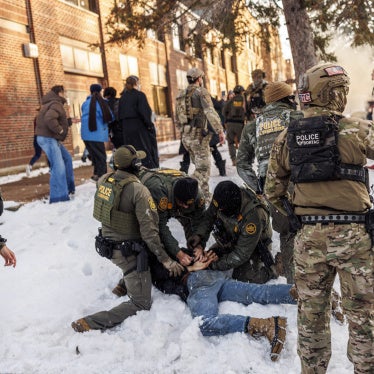Human Rights Watch made public today a letter to President Clinton calling on the United States to support the first-ever conference of the Geneva Conventions signatories, scheduled for July 15, 1999.
For this reason, we are greatly concerned by recent statements of Vice-President Al Gore and Assistant Secretary of State Martin Indyk indicating that your administration is intent on derailing the meeting of the High Contracting Parties to the Fourth Geneva Convention as recommended by a series of United Nations General Assembly "Uniting for Peace" resolutions, most recently Resolution ES-10/6 of February 9, 1999, and scheduled for July 15. The United States was one of two states voting against these resolutions. On May 23, Vice-President Gore told the annual meeting of the American-Israel Public Affairs Committee that "we will work diligently to halt the meeting.... America will boycott it, and we will urge others to do the same." On June 8, Assistant Secretary Indyk, in a prepared statement to the House International Relations Committee, declared that "the Administration is working hard to see that the proposed July 15 meeting of the High Contracting Parties to the Fourth Geneva Convention does not take place. We have voiced our opposition to such a meeting in the strongest terms, have made clear that we would not attend a meeting if it takes place, and we have encouraged all others to do likewise." According to Assistant Secretary Indyk, the administration believes that "[t]his meeting will not contribute to the peace process," and he compared it to "unilateral steps—such as unilateral declaration of statehood or provocative settlement activity—that could prejudge the outcome of permanent status negotiations."
In adopting this stance, the administration would subordinate the international community's humanitarian law obligations to the political negotiations you have been promoting between Israel and the Palestine Liberation Organization. Common Article 1 of the Geneva Conventions enjoins the U.S. as well as the other High Contracting Parties "to respect and to ensure respect for the present Convention in all circumstances." We recognize that the administration has set a very high priority on a successful outcome of this negotiating process. At the same time, we consider it to be a grave error for the U.S. to insist that steps to address ongoing violations of international humanitarian law should be set aside in deference to this effort. We do not believe that the administration wishes to assert that the process or outcome of these negotiations are incompatible with full respect for international humanitarian law.This, however, is the clear implication of the statements of the vice president and the assistant secretary. To let their statements stand unamended is to set a terrible precedent for enforcement of international humanitarian law not only in this but also in other ongoing and future conflicts.
International humanitarian law was developed and codified precisely to govern the behavior of states and other actors in situations of armed conflict, including military occupations. It provides a baseline for protections that must govern the practices of the parties to a conflict. The principles of international humanitarian law can and should contribute to the process of negotiating a peaceful resolution to this conflict. In any case, the requirement to comply with and enforce the protections of civilians embodied in the Fourth Geneva Convention is not a matter that is contingent on the outcome of negotiations between the parties to a conflict.
To equate an effort to enforce international humanitarian law with violations of that law, as Assistant Secretary Indyk did in his June 8 statement, betrays a misunderstanding of the principles of humanitarian law, and runs counter to the stress you yourself have often placed on the importance of the rule of law in international relations. Subsequently, at a press briefing on June 29 in connection with the visit of Egyptian President Husni Mubarak, Assistant Secretary Indyk declared that "there is in the Geneva Accords no mechanism—a mechanism does not exist. It has been invented for the purposes of trying to put Israel in a corner on the settlement issue." He subsequently referred to the proposed meeting as "some international forum which doesn't have a basis in the Conventions for a meeting, and which cannot produce a positive result, by its very nature."
The language of Article 1?to respect and ensure respect for the present Convention in all circumstances"—is clear: responsibility lies in the first instance with the occupying power to ensure that its practices comply with the law. Israel, alone among the High Contracting Parties to the Conventions, disputes the applicability of the Fourth Convention to the lands it occupied in 1967. In such a case where the refusal of a party to a conflict to accept applicability renders the internal enforcement mechanism inoperable, other High Contracting Parties are enjoined to consider steps to bring about compliance. While the Convention does not specify remedies or recommend actions to secure respect by another High Contracting Party, it clearly envisions that steps will be taken. Article 149 of the Convention, moreover, states that "No High Contracting Party shall be allowed to absolve itself or any other High Contracting Party of any liability incurred by itself or by another High Contracting Party" regarding grave breaches.
One hundred and fifteen of the 188 High Contracting Parties to the Geneva Conventions, including virtually all of the major allies of the U.S. such as Canada, Netherlands, South Africa, and the United Kingdom have voted as members of the U.N. General Assembly, in accordance with Article 1 of the U.N. Charter, to reaffirm their duty under common Article 1 of the Conventions. They thereby initiated an effort to consider appropriate and adequate steps, individual and joint, to enforce the Conventions. The resolution called on Israel to accept the de jure applicability of the Fourth Geneva Convention in the territories it has occupied since 1967, and to reverse actions that contravene this Convention. The resolution reflects the failure of earlier efforts by many of these same High Contracting Parties, bilaterally and via the U.N., to gain Israel's compliance in this regard.
The purpose of the conference called for by the resolutions is to consider steps that High Contracting Parties might take individually or in a collective fashion to address enforcement of the applicable provisions of the Fourth Geneva Convention in this case. Of Israel's recognized grave breaches of the Convention, it is the policies of systematic seizure of land and resources, and population transfer, that intersect most directly with the pending final status negotiations. Although in recent years the U.S. has preferred to criticize Israel's settlements policies in terms of their negative impact on negotiations, for many years U.S. government officials at the highest levels quite properly characterized those policies as being violations of the Fourth Geneva Convention. While the conference of High Contracting Parties is not and should not be designed to address the political issues in dispute between Israel and the Palestine Liberation Organization, neither is it justified or consistent for the U.S. and Israel to decide unilaterally that certain practices, because they are also salient issues of political dispute, cannot and should not be addressed as grave breaches of international humanitarian law.
Although this would be the first convening of a meeting by High Contracting Parties to address matters of compliance and enforcement, it is not entirely without precedent. You will recall, for instance, that in 1995, at the time of the war in Chechnya, special meetings were held in the framework of the OSCE and in other settings to address grave breaches of international humanitarian law by all parties to the conflict, including Russia. Likewise, numerous meetings have been convened under U.N. and other auspices to address violations of humanitarian law in the former Yugoslavia and the Great Lakes region of Central Africa. The particular modality of the meeting called for in General Assembly Resolution ES-10/6 of February 9, 1999 is indeed new, but the concept of holding such meetings is now enshrined in international practice.
The meeting called for here will itself invariably be precedent-setting. It is crucial that those precedents lend support to the principle of accountability for violations of the laws of war. The modality of the conference called for by the High Contracting Parties remains open. It could, for instance, be informal and in camera. The agenda can and should be designed in a way to avoid at all costs politicization of the High Contracting Parties' consideration of the range of instruments and mechanisms available to them for restoring respect for the rights of Protected Persons under the Convention. Rather than a terminal process, the conference could be designed as an initial forum to set in motion a process of continued contact among participating High Contracting parties on matters of enforcement.
Human Rights Watch believes that this initiative can represent an important step forward in international efforts to promote compliance with international humanitarian law and accountability for violations of that law. It is also our conviction that a stable and durable peace between Israel and the Palestinians must rest on the respect of all parties for internationally guaranteed human rights and international humanitarian law. The protections provided to civilians in the Fourth Geneva Convention cannot and should not be open to political bargaining. We regard it as unfortunate that the U.S. government feels obliged politically to decline to participate in the July 15 meeting of the High Contracting Parties. Even if this remains your position, however, we urge you in the strongest terms to ensure that the U.S. does not campaign to undermine this conference in any manner. Finally, we urge your administration to affirm publicly that respect for international humanitarian law generally and the Geneva Conventions in particular remains a bedrock principle of U.S. policy, and that the protections afforded by the conventions are not a matter for negotiations between parties to a conflict.
Sincerely,
/S/
Hanny Megally
Executive Director
Middle East and North Africa Division
Human Rights Watch








